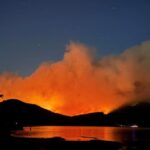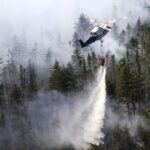British Columbia·NewRecords were broken everywhere from the southern tip of Vancouver Island to the Fraser Canyon and Smithers in B.C.’s northwest on Saturday.Lytton records high of 38.6 C as temperature records broken throughout provinceAkshay Kulkarni · CBC News · Posted: Aug 24, 2025 11:22 AM EDT | Last Updated: 9 minutes agoA whale watching boat departs as a Harbour Air seaplane lands, in Victoria earlier this year. The Victoria area saw record high temperatures for Aug. 23 amid a hot spell in B.C. (Darryl Dyck/The Canadian Press)A late summer hot spell in B.C. led to over a dozen communities breaking maximum temperature records for Aug. 23, according to Environment and Climate Change Canada.Records were broken everywhere from the southern tip of Vancouver Island to the Fraser Canyon and Smithers in the northwest on Saturday.In the Victoria area, a high of 31.1 C broke a record stretching back nearly 100 years, according to Environment Canada, with the previous record for Aug. 23 being set in 1916.Lytton, in the Fraser Canyon, recorded a high of 38.6 C, breaking a record set in 1958.Other communities that shattered maximum temperature records include Abbotsford, West Vancouver, Whistler and Pemberton.Environment Canada has maintained a heat warning for the inland regions of the North Coast on Sunday, including Terrace and Kitimat.That warning is expected to last at least until mid week, according to forecasters, and no rain is anticipated for most of B.C. this week.Hot temperatures are expected to stick around in B.C. for much of the week, with no rain in the forecast. (Ethan Cairns/CBC)”A ridge of high pressure building over B.C. is bringing elevated temperatures to the region this weekend into the early part of next week,” the warning reads.”A gradual cooling trend is expected during the latter half of next week.”The B.C. Wildfire Service said in an update on Friday that a prolonged heating and drying trend would continue into next week.”With hot, dry weather and no precipitation in the forecast, forest fuels can dry out quickly and become more susceptible to ignition,” the service said in its update.”Remember to be responsible with any permitted open fire use, and keep in mind that vehicle exhausts and sparks from equipment can easily ignite a fire.”ABOUT THE AUTHORAkshay Kulkarni is an award-winning journalist who has worked at CBC British Columbia since 2021. Based in Vancouver, he is most interested in data-driven stories. You can email him at akshay.kulkarni@cbc.ca.
Victoria area in B.C. breaks nearly 100-year-old temperature record amid hot spell











